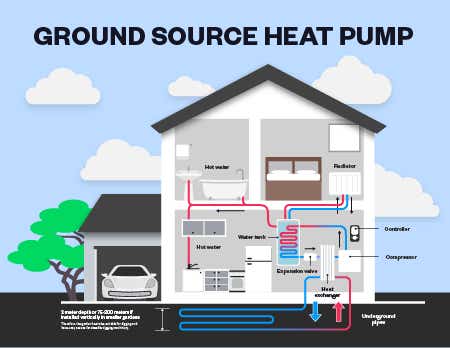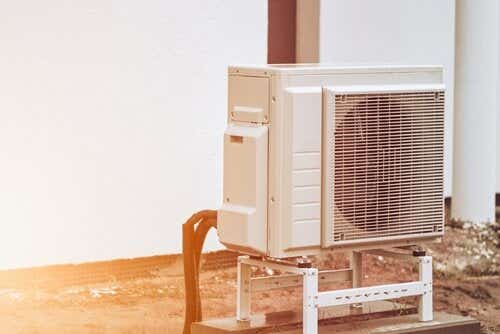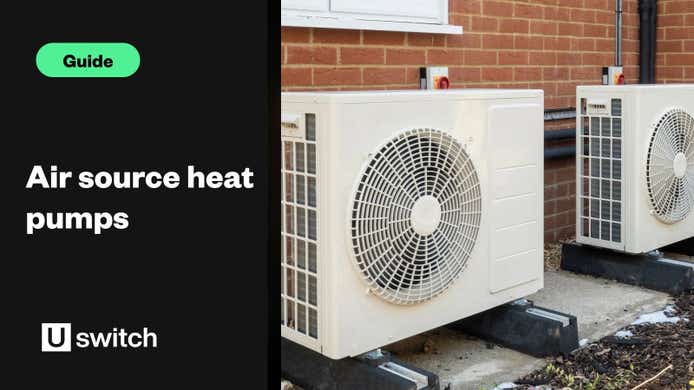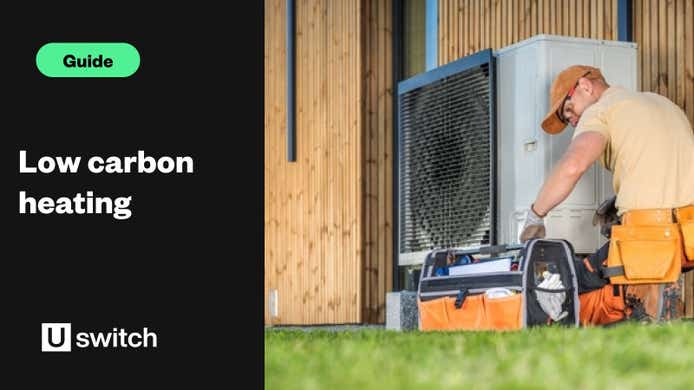Very few homes in the UK have anything other than a boiler heating the home and, while this fairly old technology has become increasingly efficient, the rising cost of gas means many households are looking for cheaper and greener solutions.
Ground source heat pumps are a cost-efficient solution to boilers. In this guide, we help answer whether a ground source heat pump is right for your property, if it can save you money, and what the pros and cons are.
How do ground source heat pumps work?

Ground source heat pumps are basically like circular wells, pumping thermal transfer fluid through a loop which is buried in the ground, either in trenches or in a borehole. The fluid absorbs heat from the ground and then flows back out again to heat your home.
Inside the ground source heat pump, you will find an evaporator, compressor and condenser. After the water is pumped back out of the ground, they then further increase the temperature of the water using the compressor unit, and this heated water then flows into your home's heating system.
How is a ground source heat pump installed?
Ground source heat pumps also have internal units, but they’re less straightforward to install because they require underground pipes to be fitted. This involves digging up your garden, which might not always be possible. The pipes can be laid vertically in the borehole, which means specialist equipment will need to be used, or horizontally in the trenches, which is more straightforward but requires more space, so you’ll need a large garden.
However, once the pipes have been laid, the garden won’t look any different than it did before, so as long as you can tolerate the time it takes the pipes to be laid, you don’t need to worry about the garden becoming unusable.
What's the cost of a ground source heat pump?
Ground source heat pumps are a lot more expensive than air source heat pumps. The Energy Saving Trust says that they could cost anywhere from £28,000 to £57,000 depending on whether trenches or a borehole are used to lay the ground loop.
Are domestic ground source heat pumps a renewable energy source?
Generally speaking, yes. Ground source heating uses less CO2 than other forms of heating systems, particularly electric heating or coal. It isn't, however, CO2-free, as the compressor unit still requires electricity to run.
Because the heat pumps generate their energy from a renewable source — that is, the earth itself — ground source heating is considered a renewable form of energy. This means that if you install one, you may be eligible for a grant under the Boiler Upgrade Scheme scheme.
How energy-efficient are ground source heat pumps?
Ground source heat pumps are generally considered to be more energy-efficient than air source heat pumps. This is because the heat taken from the ground is transferred through the pipes in the garden via water, which is better at holding heat than air.
Ground source heat pumps also have very consistent temperatures to work with - the UK’s ground temperature range (excluding Northern Ireland) sees southern England enjoying average ground temperatures of 12.7°C and northern Scotland seeing an average of 8.8°C.
Is a ground source heat pump suitable for my property?
A domestic ground source heat pump is a fairly big piece of equipment, much of it underground, and therefore requires some extensive work to have it installed. The main issue is determining whether your garden is suitable for the ground loop system to be installed.
The ground loop is typically placed in trenches roughly two metres in depth, but in smaller gardens the borehole can be dug vertically to a depth of 75-200 metres.
Therefore, the garden has to be suitable for digging and have easy access for sizeable digging machinery. The good news is that once the system is installed, it needs very little maintenance, and isn't reliant on a steady external heating fuel supply or deliveries — such as the case with some different types of boilers.
It is also worth noting that ground source heat pumps will generally heat your unit at a slightly lower temperature than traditional gas or electric units - so they are better suited to well-insulated homes with thorough draft-proofing in place.
This lower temperature also means that ground source heating systems are typically left on for longer, particularly in the winter months.
Finally, the type of heating system the unit is feeding, and the fuel it is replacing, will determine whether a ground source system will save you money.
The unit will also save you much more money if it is replacing an electric or coal-based system. If your home is on mains gas it may not be a suitable option.
What are the advantages and disadvantages of ground source heat pumps?
They are environmentally friendly compared to other heating systems
You may be eligible for payments under the Renewable Heat Incentive scheme
Ground source heat pumps are low maintenance once installed
They use a renewable resource efficiently
They are expensive to install
They are most effective if you have underfloor or air heating systems
The installation process will mean significant work and disruption to your garden
While ground source heat pumps clearly aren't suitable for every house and require a lot of work to install they can be worth the effort and could help reduce your energy bills.
If you're looking to cut your bills remember to do the basics right as well, from properly insulating your home and installing draught-proofing to closing doors to unused rooms. For more advice you can read our guide to energy-saving tips and start making small changes to save a lot of money.
Are ground source heat pumps good for the environment?
Ground source heat pumps are one of the better heating options as far as the environment is concerned. You can see more information about the effect they’ll have on your carbon emissions below, but in almost every case they’ll be less detrimental than a standard gas or oil boiler - and if you can source your electricity from renewables, it’ll be even better for the environment.
Do ground heat pumps emit carbon?
Ground heat pumps don’t emit any carbon themselves, but the electricity required to operate them may well do, unless it comes from a specifically renewable source like wind or solar power. While a domestic ground source heat pump will greatly reduce your carbon emissions, the whole operation won’t be completely carbon-free unless you address the source of your electricity as well.
How much carbon do ground heat pumps save?
According to the Energy Saving Trust, as of November 2024, a well-insulated four-bedroom detached home in England, Scotland or Wales could save as much as 12,000kg of carbon emissions per year if they install a ground heat pump.
| System being replaced | CO2 saving (kg per year) |
|---|---|
| Old (G-rated) gas boiler | 4,500 |
| New (A-rated) gas boiler | 3,000 |
| Old electric storage heater | 3,600 |
| New electric storage heater | 2,500 |
| Old (G-rated) oil boiler | 7,000 |
| New (A-rated) oil boiler | 4,500 |
| Old (G-rated) LPG boiler | 5,000 |
| New (A-rated) LPG boiler | 3,500 |
| Coal | 12,000 |
Can you get a grant for a ground source heat pump?
Many initiatives aren’t specific ground source heat pump grants, but they are generally designed to help households offset the cost of installing energy-efficient heating systems. However, the replacement Boiler Upgrade Scheme will offer homeowners up to £6,000 to install a ground source heat pump in place of existing gas or oil heating and may be worth applying for if you're after a ground source heat pump.




